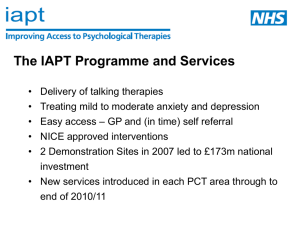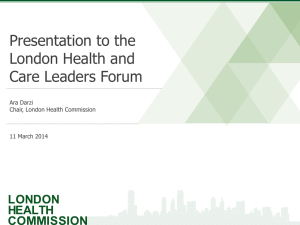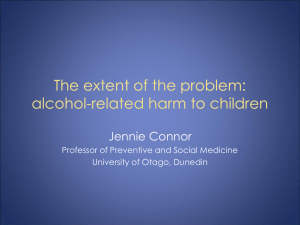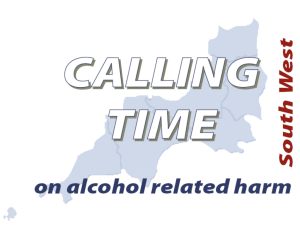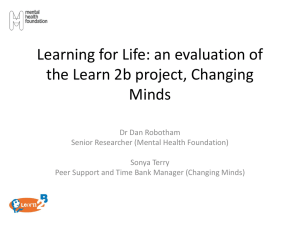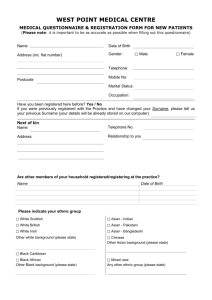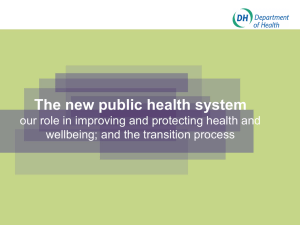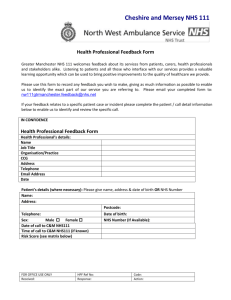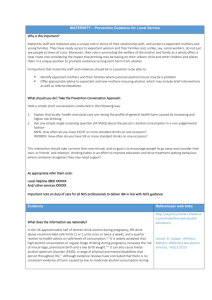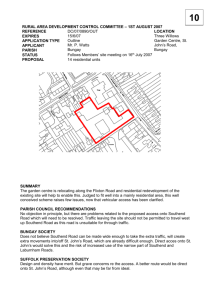A Definition of Public Health - South East and Central Essex Mind
advertisement
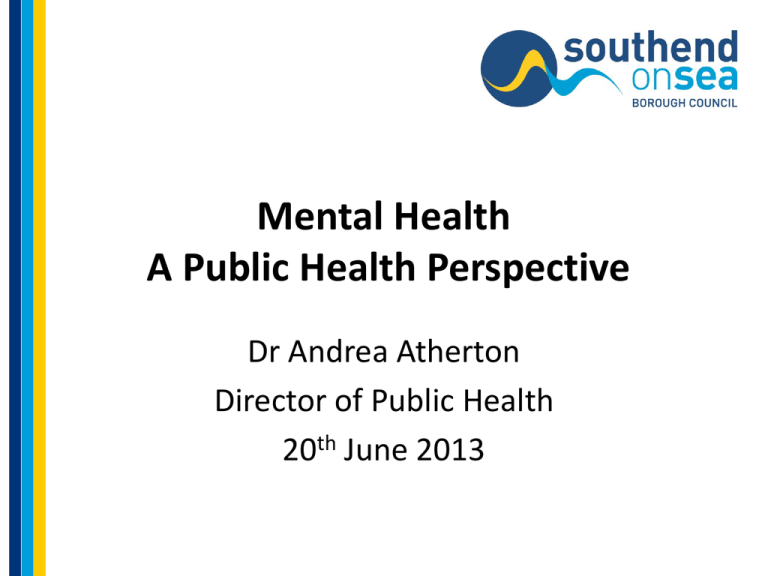
Mental Health A Public Health Perspective Dr Andrea Atherton Director of Public Health 20th June 2013 A Definition of Public Health Public Health is the science and art of preventing disease, prolonging life and promoting health through the organised efforts of society. Sir Donald Acheson A Definition of Health Health is a state of complete physical, mental and social well-being and not merely the absence of disease or infirmity. World Health Organization 1948 A Definition of Mental Health Mental health is not just the absence of mental disorder. It is defined as a state of well-being in which every individual realizes his or her own potential, can cope with the normal stresses of life, can work productively and fruitfully, and is able to make a contribution to her or his community. World Health Organization The Determinants of Health ……and the determinants of mental health NHS Reforms and Opportunities for Public Health Health and Social Care Act 2012 • From 1st April – PCTs and SHAs abolished • Clinical Commissioning Groups - local commissioning bodies (Southend CCG) • NHS England:28 area teams (Essex Area Team) New public health system • Public health in upper tier/ unitary authorities • Public Health England NHS Reforms (2) • Focus on outcomes – 3 outcomes frameworks • Public Health Outcomes Framework • Requirement for CCGs and Local Authorities to prepare a Joint Strategic Needs Assessment and Health & Wellbeing Strategy • Local authorities are required to have a Health & Wellbeing Board – membership to include local authorities, NHS, Healthwatch Southend Health& Wellbeing Strategy • • • • • • • • • A positive start in life Promoting healthy lifestyles Improving mental wellbeing A safer population Living independently Active and healthy ageing Protecting health Housing Maximising opportunity Why prevention of mental health problems is a public health priority • At least one in four people will experience a mental health problem • One in ten children 5-16 yrs has a mental health problem • Self harming in young people: 10-13% of 15-16 year olds has self harmed • Almost half of all adults will experience at least one episode of depression • One in ten new mothers experiences post natal depression Why prevention of mental health problems is a public health priority (2) Economic impact • Cost to the economy in England : £105 billion Effectiveness of treatment modalities • Current limitations in effectiveness of treatment modalities The evidence • Preventative interventions: risk factors and protective factors A Positive Start to Life….. Risk factors for mental disorder in children and young people • Use of alcohol, tobacco or drugs during pregnancy • Maternal stress during pregnancy • Low birth weight • Poor maternal mental health • Unemployed parent / no qualifications • Poor parenting skills • Deprivation Neurological Development • Brain development depends on both genes and experiences • Rapid brain development takes place in the first year of life • Early interactions directly affect the way the brain is wired • Early relationships set the thermostat for later control of stress response Family Nurse Partnership Programme • A structured intensive home visiting programme delivered by family nurses & family nurse supervisors • A preventative programme • First time parents under 20 • Nurses visits parents from pregnancy until child age two • Each visit uses materials and activities to build selfefficacy, change behaviour and promote attachment FNP in Southend • Higher deprivation compared to England • Higher levels of long term unemployment • Relatively high levels of the adult working population with no qualifications • High levels of mental ill health • High levels of drug misuse • High numbers of hospital stays for alcohol related harm • I in 4 children live in poverty • Number of children on the child protection register and Looked After Children • Southend has a high teenage pregnancy rate Outcomes of FNP • Rigorously tested – 3 scientific trials in USA and in UK since 2007 • Improvements in women’s antenatal health and behaviours • Better parenting • Better outcomes for children: • Higher IQs, better language development, better school readiness in maths, fewer behaviour/ mental problems reported Alcohol and mental health Impacts of Alcohol • UK is among the heaviest alcohol consuming countries in Europe • Over 1.1 million alcohol related hospital admissions per year • 3% of deaths in UK attributed to alcohol • Alcohol-related harm costs society around £21 billion per year Health Effects of Alcohol Acute • Acute toxic effects of alcohol poisoning • Impaired judgement leading to unintentional injuries and accidents • Risky sexual behaviour • Self harm and suicide: alcohol is implicated in up to 65% of suicides in the UK Chronic • Neurological problems • Cardiovascular problems • Psychiatric problems: depression, anxiety, and suicide • Cancer: mouth, throat, oesophagus, liver, colon, and breast • Liver diseases: alcoholic hepatitis and cirrhosis Wider Impacts of Alcohol “Passive Drinking” • Antisocial behaviour • Crime - violence - vandalism • Domestic abuse • Family breakdown • Child protection • Road traffic accidents Defining Drinking Patterns • 1 unit of alcohol = 10ml or 8gms of pure alcohol • Guidelines: men 3-4 units /day women 2- 3 units/day Defining Drinking Patterns • Binge drinking:> 2x daily guidelines in one day • Moderate – heavy (hazardous) 22-50 units /week for men 15 -35 units /week for women • Very heavy: (harmful) - 6% of men, 4% of women 51+ units /week for men 36+ units /week for women • Alcohol dependency - 6% of men, 2% of women Interventions to Reduce Harm from Alcohol • Media • Regulation, including age restriction • Taxation – minimum pricing Harmful drinkers buy 15 x more alcohol than moderate drinkers, yet pay 40% less per unit. MUP of 50p per unit would reduce total alcohol consumption by 6.7% in the first year • Multi -buy discounts – restricting to 10% is equal to MUP of 40p per unit Interventions to Reduce Harm from Alcohol • Business sector sign up to Public Health Responsibility Deal Pledge to ‘foster a culture of responsible drinking, which will help people to drink within guidelines’ • Product labelling on unit content • Unit messaging in the on-trade and off-trade • Combatting under age sales: Challenge 21 &25 • Actions on advertising – including not putting adverts near schools Identification and Brief Interventions • Use of AUDIT tool to identify hazardous and harmful drinking • Brief interventions constitute a variety of activities characterised by their low intensity and short duration • Highly cost effective – numbers needed to treat is 8-10 • Now included as part of NHS Health Check Look After Your Mental Health… • • • • • • • • • • Talk about your feelings Eat Well Drink sensibly Keep in touch Take a break Accept who you are Keep active Ask for help Do something your good at Care for others THANK YOU Any questions?
